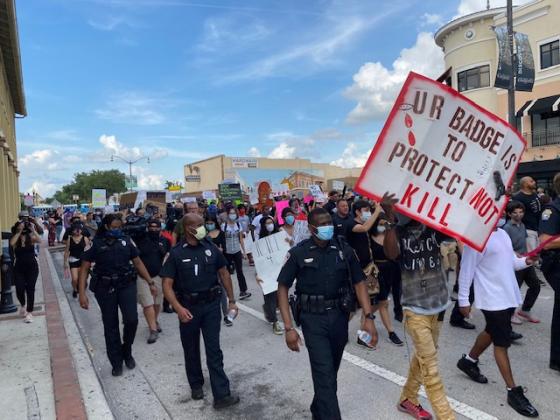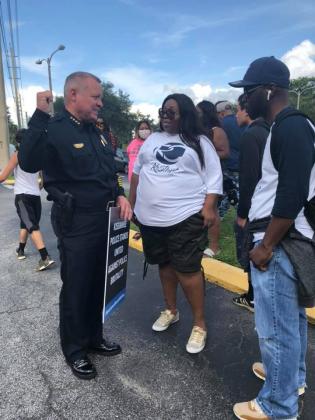Local law enforcement officers joined more than 1,000 demonstrators Monday evening in downtown Kissimmee to protest police brutality in the wake of the killing of George Floyd by a Minneapolis police officer.
Osceola County’s three local law enforcement chiefs condemned the killing and vowed to work with the community and to improve relations between the public and the police.
“In 40 years I’ve never seen such an egregious act as the one we saw in Minnesota,” said St. Cloud Police Chief Pete Gauntlett. “Thank you for allowing us to be part of this today and keep talking to us. Let’s have town hall meetings, let’s have review processes and so you can know what we are all about because we want to know what you are about,” he said.
The Kissimmee Police Department helped facilitate the event after officers reached out to organizers over the weekend and asked to join them in a show of solidarity.
One organizer filmed KPD Lt. James Napier on Sunday touting the collaboration as a way “to go out and march and stand together and say that this is unacceptable, not just in Kissimmee, not just in Osceola, but in our entire country.”
Organizer Kay Odem, who grew up in Osceola County, said that police participation in a protest against police brutality bodes well for the community.
Local law enforcement has “really changed over the years. They have actually evolved,” she said. A lot of people who were ‘good ol’ boys’ are not around. And so I’m finding that it’s easier to build a relationship because we don’t have an old standard or old stigma. People are moving forward and they want a better city.”
“We wanted to show the whole country that it’s not us against the police, that we’re all a united community,” Odem said.
Unlike the unrest and rioting in other cities over the weekend and into Monday, Kissimmee was among those that saw peaceful protests. No riot gear. No violence.
The march started at the Kissimmee Civic Center, proceeded down Broadway, and culminated at KPD headquarters.
From Floyd’s dying words, “I can’t breathe” to “No justice, no peace” and “Say his name, George Floyd,” chants rang out among marchers.
One of them was 14-year-old Kiniah Rice, whose resolute voice carried her section of the crowd from start to finish.
Kiniah said she was angry “because you think of the cops and that’s who you call when you’re in trouble. But when the cops are the ones doing the damage, you don’t know who to call. You don’t know if you can trust the cops to be on your side.”
Her mother, Kinisha Rice, said they have family members in law enforcement and that she brought her children to the demonstration because it was held in conjunction with the police.
“It’s not anti-law enforcement on our part,” she said.
Marching alongside police officers makes them more approachable and less scary, both to children and to adults, she said.
“I also wanted to plant a seed for the future and show (my kids) that there’s a safe and responsible way to make their voices heard and to be part of something bigger,” Rice said.
During the march, Kissimmee Police Chief Jeff O’Dell carried a sign that read: “KISSIMMEE POLICE STANDS UNITED AGAINST POLICE BRUTALITY.” It seemed to win him some credibility among protestors.
At the culmination of the event, O’Dell stood on a small box in front of the police station and vowed to set up a channel of communication for the public to address the department regarding excessive force, police brutality and racial profiling.
He also told the crowd that KPD instituted a peer intervention program three years ago that trains and mandates officers to intervene when another officer shows excessive force.
“You absolutely matter. You matter to me and you absolutely matter to everybody in this police department. And if I find out otherwise, they won’t work here anymore. It’s pretty simple,” O’Dell said.
Several members of the community also spoke on the makeshift stage where the crowd concentrated and the chanting continued at times.
Tamika Lyles, president of Osceola County Democratic Black Caucus, called on local law enforcement agencies in Osceola to create civilian oversight committees.
“Police can’t police police,” Lyles said. “We understand that many of you are good...We also understand how difficult it is for you to come forward. I’m asking that instead of marching and singing we put in real action,” she said.





